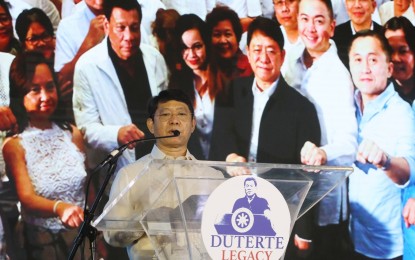
PARTICIPATORY GOVERNANCE. Interior and Local Government Secretary Eduardo Año cites participatory governance as one of the achievements of the Duterte administration during the Duterte Legacy Summit at the PICC in Pasay City on Monday (May 30, 2022). The two-day summit will highlight the legacies that President Rodrigo Roa Duterte will leave behind once he steps down from office on June 30. (PNA photo by Avito C. Dalan)
MANILA – Participatory governance was a major point in the administration of President Rodrigo R. Duterte, Department of the Interior and Local Government (DILG) Secretary Eduardo Año said Monday.
“Indeed, democracy reached its peak during the term of the President when people’s needs were heard and addressed and they were made part of improving their own lives and charting their future. People’s (participation) in governance was neither a slogan nor an empty promise. It was a fruitful and truthful reality this time," he said during the Duterte Legacy Summit at the Philippine International Convention Center in Pasay City.
He said in the past six years, various national government agencies "worked hand-in-hand to collaborate" with one another and reach out to the citizens to make them aware of the people’s concerns and ensure that these are addressed “adequately and immediately.”
Año said this milestone was achieved through the “participatory governance cluster” emphasizing that the people’s active involvement was a key factor in the government’s efficient and swift delivery of public service.
“This is the story in the past six years where the administration of President Rodrigo R. Duterte engaged the Filipino people in governing and solving their problems and the country’s other concerns," he said.
At the start of his term, Año noted that Duterte had already laid down his plan to enhance the public’s relationship with the government in attaining an effective way of governance.
DILG and its government agency partners also worked in unison to implement “governance reforms” to strengthen transparency and accountability in the government to “ensure an effective public service in partnership with the people.”
Through Hotline 8888, Año said authorities addressed the public’s complaints about government agencies that failed to provide the appropriate services at the most appropriate time.
He noted that more than 2.5 million complaints were received and resolved by the concerned government agencies from 2018 to 2021 which paved the way for red tape and other forms of corrupt activities to drop dramatically.
The “Emergency 911 Hotline”, he said, gave the public the link for the concerned government agencies to address their needs immediately during distress times like natural or man-made calamities or tragedies.
He also recognized that the “Dagyao Town Hall” meetings in various localities provided the citizens with a closer avenue to air their concerns and grievances to the government.
Amid the Covid-19 pandemic, Año said the government continued its Dagyao Town Hall meetings to further strengthen the relationship between the people and the government.
He said the government reinforced the "participatory governance" to end insurgency and communism which has struck misinformation, fear and terror in the country in the past five decades, especially in the areas identified as “conflict-affected communities.”
Through the retooled community support program, Año said the government gathered all sectors of the local community, listened to their needs, concerns and aspirations and “provided them the response they wanted from our government, the right funding and projects for their needs."
To promote transparency and accountability, he said the President directed all government agencies under the executive branch to ensure public access to information.
“As of today 61,903 requests to the freedom of information portal have been responded to by concerned agencies, a manifestation of the government’s commitment to operationalize the people’s right to information,’’ he noted.
Año also confirmed that the local government units (LGUs) are being monitored “on how they manage and utilize public funds.’’
“We are likewise working on the immediate passage of the freedom of information bill to cover all the three branches of the government to bring greater transparency on public transactions and documents,’’ he said.
Among the DILG’s priorities, he said, is to make the LGU officials involved in all forms of anomalies answerable for their lawless deeds.
In reference to the Covid-19 response, Año acknowledged the people’s key role as watchdogs that prevented the local officials from abusing their power and ensured their lawful adherence to their sworn duties as public servants. (PNA)
